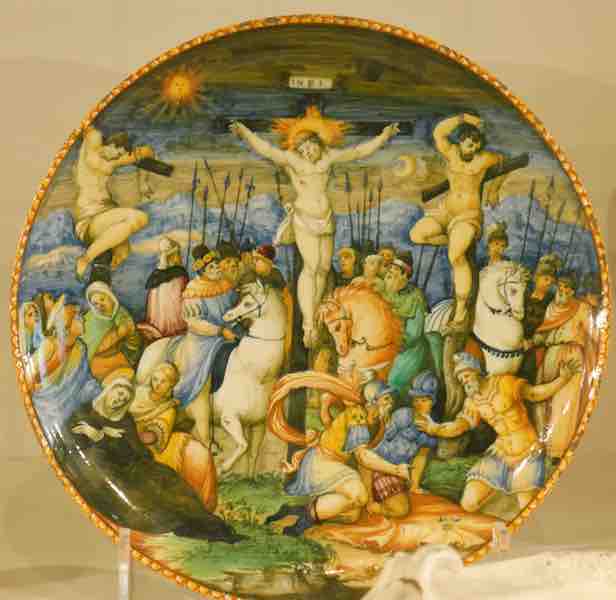Is the cross madness or wisdom ?
Unreasonable for the Greeks of Corinth who prefer the wisdom of the world. But in fact the cross is the true wisdom of God.
Paul explains this in the context of ancient Greece in 1 Corinthians 1:18-31.
How does this relate to our society today?
Corinth and the birth of the Church
Corinth, a growing town
Corinth was a growing, modern commercial city of over 500,000 inhabitants, rebuilt by Julius Caesar after its destruction in 146 BC.
73 km from Athens, two ports for sea trade at the entrance of an isthmus. This is a narrow strip of land, 6,5 km long between the Peloponnese in the south and continental Greece in the north.
To avoid a 400 km trip around southern Greece, the sailors drove the boats along a stone path across the isthmus.
The Corinth Canal

Since then, in the late 19th century, a canal has been dug… but too narrow for today’s large ships. To make fun of it, the Athenians today call it “the gutter”.
The Isthmic Games
Isthmic Games were held every two years near Corinth. Sport like the modern Olympic Games, but also speech and rhetoric competitions, i. e. the art of persuading through language.
The city is famous for its speakers and its literature. Style is more important than content ; the performance is sometimes a big, well-spoken void.
Trafficking, prosperity and… immorality
A few large fortunes next to the misery of the greatest number
A hectic life in temples, baths, agora, (market square) theatres.
A proverbial immorality. “To live like Corinthians » means to live in debauchery.
12 temples of various divinities ; the most famous, that of Aphrodite with more than 1000 sacred prostitutes.
Philosophical schools (Plato, Aristotle, Stoics) and mystery religions (with secrets and initiation) attract a large clientele.
But also a synagogue with a thriving Jewish community.
Paul’s preaching in Acts
It was there, in the synagogue, among the Jews, that Paul began to preach. This is told in chapter 18: he announces Jesus the Messiah (Acts 18:1)…. until the Jewish opposition forces him to turn to the heathens. (Acts 18:4-7)
He stays there a year and a half. Many, listening to Paul, became believers and asked for baptism (Acts 18:8).
A vision confirms him in his mission I have many people in this city “(Acts 18:9)
Jews and Greeks convert, the Church begins to grow.
What stimulates someone to believe in the Christ ?
What is the element that pushes someone to take a first step towards the Christian faith?
This is not yet conversion, which is the work of the Holy Spirit through the words of preaching…
From which background?
Paul characterized it well: both for the Jews and for the Greeks
Jews demand miraculous signs and Greeks look for wisdom … philosophy (1 Corinthians 1:22)
A known background
One always needs a background, a known, familiar support point, before embarking on the unknown.
For the Jews, the background is the Old Testament, the covenant with God, the expectation of the Messiah. Yet many have understood nothing and have rejected, crucified the Messiah because he was not what they wanted.
For the Greeks, a pagan background
Lots of gods, all exceedingly folkloric and frankly immoral. Mythology no longer meets the aspirations of many Corinthians. The Jewish religion and its moral rigour attracts some.
The search for wisdom.
For the Greeks, it is a spiritual process guided by masters of wisdom. The goal: not to suffer and to obtain for the initiated, the “perfect ones”, a blessed immortality.
Contempt for humility because it is considered as weakness and as a lack of dignity.
How can we take a first step towards Christ?
Or how to incite a Greek to take a first step towards Christ, towards the Christian faith. He seems so far away…On what familiar starting point can he rely?
“Back” to ancient Greece

The visit of several ancient Greek theatres, in particular that of Delphi, opens the way for our reflection.
Greek theatre, a model open to everyone
In Greece, theatre is open to everyone. The whole population attends, including slaves. It is a political institution. The almost compulsory attendance serves as propaganda. The plays performed in front of the audience present models of behaviour to follow… or to avoid…
The Greek hero: transgression and punishment
Sometimes the hero, driven by fate, transgresses the rule, the imposed limit.
Antigone was the daughter of Oedipus and Jocaste, an incestuous couple. Oedipus killed his father and married his mother, Jocaste, without knowing it. Her two brothers, fighting on opposite sides, died at each other’s hands. Creon, the king of Thebes, representative of the law, of the golden mean, ordered a solemn funeral for one and refused to allow the other to be buried.
The hubris, a violent madness, one could also say “an impulse from the heart” pushes the hero to overcome his condition. He disrupts the balance by going beyond divine or human law. He thus exposes himself to the punishments of heaven or of human power.
Fatal error/sin… punishment/purification
The trigger is activated by the fatal error, the hamartia. In the vocabulary of the NT, it is sin. The hero then makes the fatal mistake, which makes him fall into misfortune. Antigone defies Creon’s orders by giving her brother a burial. This is the coup de théâtre. Then the hero cannot avoid the inexorable punishment of a vigilant power, the nemesis
For her disobedience Antigone is condemned by Creon to be buried alive in a tomb.
But this punishment is also the means of the purification, the catharsis.
In the tragedy Creon is on the side of the limit, of the law. Antigone refuses the limit set by the laws of the City, but she does so in the name of other unwritten laws. She goes as far as selfsacrifice. And if she transgresses, it is not for her own account.
The Greek hero and Christ: possible convergences?
The Greek of Paul’s time may have seen Sophocles’ Antigone play several times. This play features this conception of life. He also hears something about the life of Christ. And he may be wondering if there are any possible connections
He notices well one point: like the Greek hero, Jesus dared to transgress the Sabbath law. In so doing Jesus seems to go beyond the permitted limits since he scandalizes the Pharisees.
Transgressive power of the Word
Paul also underlines a certain transgressive power of the Word. Indeed, the Word of God does not care about respecting human wisdom. It does not hesitate to oppose the folly of the cross as the only way of salvation. This is the true wisdom of God (1 Corinthians 2:3).
Awakening the attention of the indifferent
Today, there is no lack of means to attract the attention of the indifferent : a film, a singer, a friendly and warm community meal, a discussion on a current topic… doing somebody a service.
However, this first contact is not enough.
How will the interested, the curious person become a convert, a disciple of the Lord?
Through the preaching of the Word
By the message of the cross read in the Bible and/or heard in a preaching.
You must have listened, understood, accepted the Word in your life, so that you can come to a conversion, a new birth, a beginning of Christian life.
But how then can they call on the one they have not believed? And how can they believe in the one of whom they have not heard? And how can they hear without someone preaching to them? Romans 10:14
In Corinth, Paul announces the Word… He testifies that Jesus is the Messiah. (Acts 18:5)… Many Corinthians who hear Paul, believe and are baptized (Acts 18:8)
It was the power of God, not human wisdom, that gave birth to the Church of Corinth.
A church filled with gifts in the Word and knowledge…
But a divided church
Old habits die hard. The Christian community has not broken with the fashion trends in the city. The various philosophical schools compete and word fights are sometimes violent.
So in the Church of Corinth: « I am of Paul, … I prefer Peter … Apollos is the best, the others do not exist next to him… »
Or,« in that Church, there is no Spirit » ; « in that one, it’s a bediam ».
Tearing and fighting for power
It is not only the expression of a preference for a particular denomination that suits us. It is the tearing apart, the irruption of antagonist groups fighting for power. As in some election campaigns…
Refocusing on the essentials
It is time to act. Paul sets the record straight.
It is not I, Paul, who was crucified for you » 1 Corinthians 1:13
For I resolved to know nothing while I was with you, except Jesus Christ, and Jesus Christ crucified 1 Corinthians 2:2.
The cross, a madness
Indeed, the preaching of Christ’s death on a cross is madness in the eyes of those who are perishing. 1 Corinthians 1:18
A madness… for those who get lost
A mighty God who stoops down in the weakness of the cross is a scandal to the Jews, an absurdity to the Gentiles (v.25)
For Jews, a humble and unknown Messiah is nonsense.
A Messiah who dies on the cross is a scandalous curse (Deuteronomy 21:33). The Messiah they expect is a powerful warrior. He will free Israel, rule the world and live forever.
As for the Greeks, they had the idea of a supreme God above everything, like many people today.
This God was a kind of immutable and immobile block. That this mighty God could act, intervene on earth, become himself man, and finally even let himself be put to death by men, this made no sense.
The resurrection of Christ as it is told to the Athenians is a stupidity that made them laugh (Acts 17:32)
For a religious doctrine to be well received, it must be accepted by many people and it must already be ancient. Now the Christian faith is a novelty…
Moreover, Christians do not participate in social life. They do not offer libations (gifts) to gods. They meet apart from others, between themselves and that is suspicious… This suspicion leads to contempt and hatred.
Tacit, a Latin historian writes about the fire in Rome: Christians are “hated for their abominations” and “found guilty, less of the crime of fire than because of their hatred for mankind” (Annals XV 44.3-4)
Christianity, an innovation which is difficult to accept.
The founder was crucified. So he’s a criminal of the worst kind. And in addition, Christians are almost all the dregs of society, poor, slaves. Not wise men who have followed the teaching of philosophers….
Miraculous signs, wisdom of the world?
The Jews demand miraculous signs,… the Greeks look for “wisdom” 1 Corinthians 1.22
In Jesus’ time, the Jews were already asking for signs. Christ refers them to the sign of Jonah, who remained three days in the belly of the fish (Mt 12:38-42).
The sign is Jesus crucified.
The Greeks are looking for a rational system.
It is absurd that someone who dies can be the Savior of the world.
A way to do without God
Ultimately miracles and wisdom are the same thing : protection, security against God. We have a little, limited knowledge of God. And we use it as a criterion of our human logic against him.
Culture, “values”, rites, reason, miracles: everything can become a means to do without God or to put him at our service. According to Karl Barth, a Protestant theologian, religion is even the most powerful tool invented by men to get rid of God.
Or a way to do without Christ
To reach God by one’s merits (the law, religious practice), to escape evil, suffering, death (to be saved) – without resorting to the crucified Christ.
The pseudo wisdom of the world, a madness unable to recognize the wisdom of God.
Indeed, where divine wisdom has manifested itself, the world has not recognized God through wisdom 1 Corinthians 1:21.
This wisdom of the world is used to turn away from God.
The natural knowledge that one can have of God has been twisted, diverted (Romans 1:18-19).
Instead of worshipping God, they turned to idols Romans 1:21-22.
By thus reducing God to the level of the creature, they imagine themselves domesticating him, putting him at their service. And they even claim to be intelligent… But they have gone mad. Romans 1:22
Temporary wisdom
Where’s the wise man? Where’s the scholar? Where is the philosopher of this age?
1 Corinthians 1:19-20
These have fallen into oblivion, with their misleading reasoning that has distracted them from the true knowledge of God. We don’t talk about it anymore.
But the Church of Corinth, with its few rich and many poor? They received the Word, the true knowledge of God through Christ’s cross. Despite their mistakes, the Bible still speaks of the Church of Corinth.
A wisdom closed in on itself, not open to the unexpected, to God’s revelation, in other words, madness
This can apply to current science and philosophy. For some scientists, there is no place for God. Their world view is closed in on itself.
Human wisdom, closed in on itself, is incapable of understanding the slightest thing about God.
So let us open ourselves to the Word and the Spirit of God
Self-centered wisdom
Today, wisdom is personal development…. “a search for peace and security that would lead us to personal fulfilment and happiness » (according to a Christian philosopher, there are some).
People want a God. As long as he doesn’t get too involved in their business, except when they need him. As long as he complies with their calculations and forecasts.
The cross, a power
But for us who are saved, it is the very power of God. 1 Corinthians 1:18.
True wisdom according to God
God’s wisdom does not come from the observation of what happens most often, but from a unique event which is unimaginable for the wisdom of the world: the incarnation of the Word, of the Word of God, of Jesus Christ (Karl Barth). Christ is the true wisdom of God.
An at first mysterious and hidden wisdom,
No, we speak of God’s secret wisdom, a wisdom that has been hidden from the world, and that God destined for our glory before time began. 1 Corinthians 2:7.
The Greek word musterion, translated as mystery in some versions, does not refer to something secret but to something that is now clearly revealed. This can describe a puzzle, when all the pieces finally come together to show the picture.
A better translation would be “strategy » or « plan”.
In his wisdom, God put together all the pieces of the puzzle of life and gave them meaning. The last piece is the coming of Jesus Christ. His death and resurrection for man’s salvation is the last piece of God’s plan to forgive him the past and give him a new present and future.
A wisdom revealed by the Spirit
Now, God has revealed it to us by His Spirit (v. 10).
It is manifested through love, through a just relationship with God and with others.
For in Christ Jesus neither circumcision nor uncircumcision has any value. The only thing that counts is faith expressing itself through love. Galatians 5.6
The cross, a true wisdom, a power that transforms.
Is giving your life for love really crazy?
Is the resurrection of Christ really an absurdity? No, it is the source of life, which makes the believer pass from death to life.
The man without the Spirit does not accept the things that come from the Spirit of God, for they are foolishness to him and he cannot understand them. 1 Corinthians 2:14
Ultimately, not madness, but true wisdom, the wisdom that has the power to transform an existence.
If any one of you thinks he is wise by the standards of this age, he should become a « fool », so that he may become wise! (3,18)
Overcoming one’s prejudices, letting the Word of the Cross judge and transform lives is the experience of many Corinthians of the worst kind. « .. sexually immorals, idolaters, adulterers, …drunkards, slanderers, swindlers … that is what some of you were. But you were cleansed, you were sanctified, you were justified in the name of the Lord Jesus Christ and by the Spirit of our God. 1 Corinthians 6:11-12
In God’s eyes, wisdom is not a purely intellectual, theoretical matter, cut off from true life. It is its power that has a transformative impact on life. It gives the means to commit one’s life to the service of God and of others.
C. Streng



